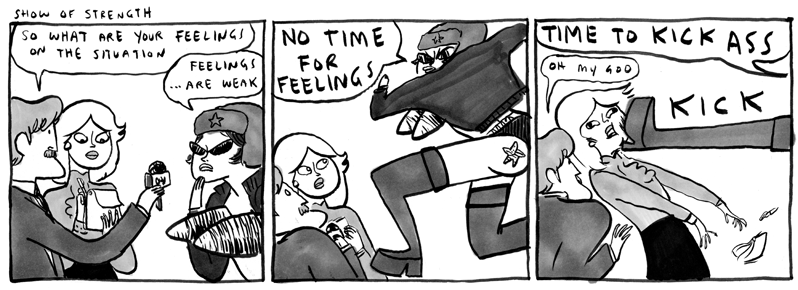By Sara Schwartzkopf, Colorado, USA, SSH Correspondent
As cold weather draws ever more present, I’m relieved. I’m relieved for the reprieve from shaving my legs every day, the ability to wear large comfy sweaters, cool-looking boots, and the drop in street harassment tales, both personal and otherwise. Not that they stop by any means. Maybe it’s just as simple as fewer people taking their time when walking the streets. Less public interaction means less opportunity for street harassment.
Instead we spend more time inside. More time is spent reading, watching movies, and getting caught up on television series. More time spent absorbing pop culture and common narratives about women. I bet some of you can see where I’m going with this. But I have neither the time or space to go through all the things that can be upsetting about media depictions of women. From catty and mindless reality tv shows to romantic comedies and “chick lit,” there’s a pretty common theme that women are horrible, or spend all their time worrying about guys. Or that they’re horrible because of a guy. It seems the antithesis to this is to seek out female lead characters, and make women be as perfect as a heroine can be.
This doesn’t work for me. There’s more than one reason for why we need diverse and well-rounded characters. It seems to me that women leads in media, especially women in sci fi/fantasy and action flicks, have a requirement to be strong (let alone a good many of them aren’t strong characters so much as just strong). They become a Mary Sue of a sort, where they react to challenging situations as we wish women could. So when we find ourselves faced with a similar situation or challenge, we often expect ourselves to be just as flawless. Media creates unrealistic depictions, and then we hold ourselves to these unrealistic expectations.
The problem is we are flawed. Everyone is. Yet when we have an issue with say, harassment, it’s natural to judge ourselves on what we’ve had modeled for us. So what’s the natural outcome when every time we see a woman in a male-dominated environment who responds to harassment by physically or verbally beating up her antagonist? I think it reinforces that we should be able to do this for ourselves. It’s incredibly satisfying to watch, but when it’s the only narrative out there we act as though it’s the woman’s job to overpower their aggressors. It ignores consequences, forgets the possibility of continued contact, and it plays into this idea that men only need to respect women who are physically stronger than them.
It’s one solution to the Damsel in Distress trope, but it’s also one that puts responsibility squarely on the victims. If the heroine of the story can’t stop what’s going on then it becomes her fault, rather than the aggressor’s. It doesn’t really challenge rape culture, it just shifts how women are supposed to deal with it.
Maybe that’s why we judge passive reaction more harshlythan we should. We think that if we were confronted with harassment of any sort we would stand up for ourselves and give a verbal equivalent of a beat down. Instead, a lot of us feel threatened, ignore comments, and try to leave as quickly as possible. That doesn’t keep up from blaming victims though. We forget that we need to place the blame solely on the harasser. After all it was their decision to shout things, to grab, to make obscene gestures, or do sexually explicit things that were never asked for in the first place.

Sara is a recent graduate of the University of Denver where she majored in Sociology, International Studies, and minored in Japanese. She has previously written on issues relevant to the Native American community at Le Prestige Du Monde, pulling heavily on her experiences as a mixed-race Kiowa and Chickasaw.
